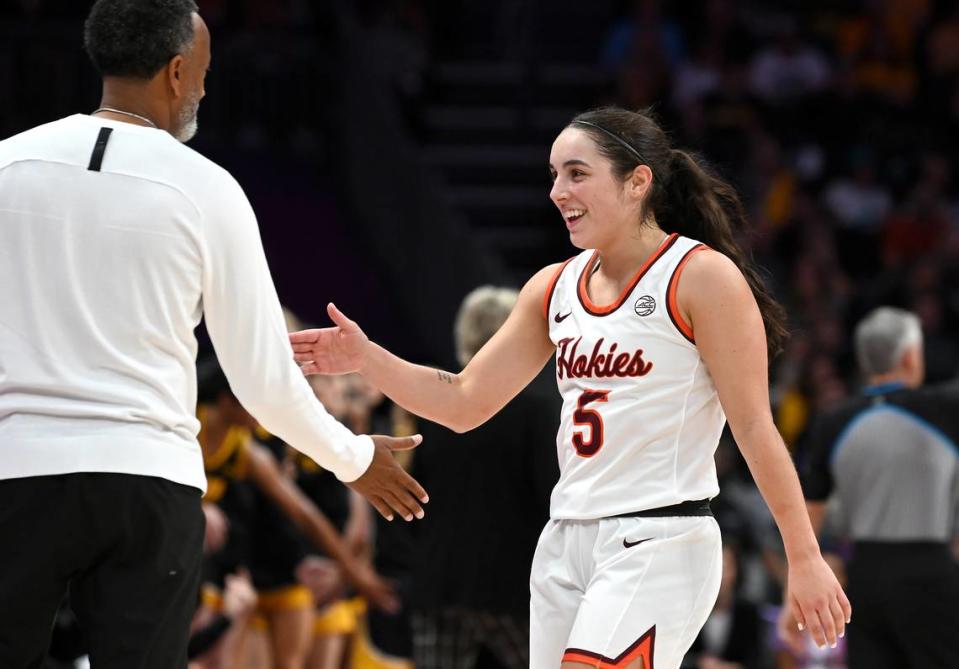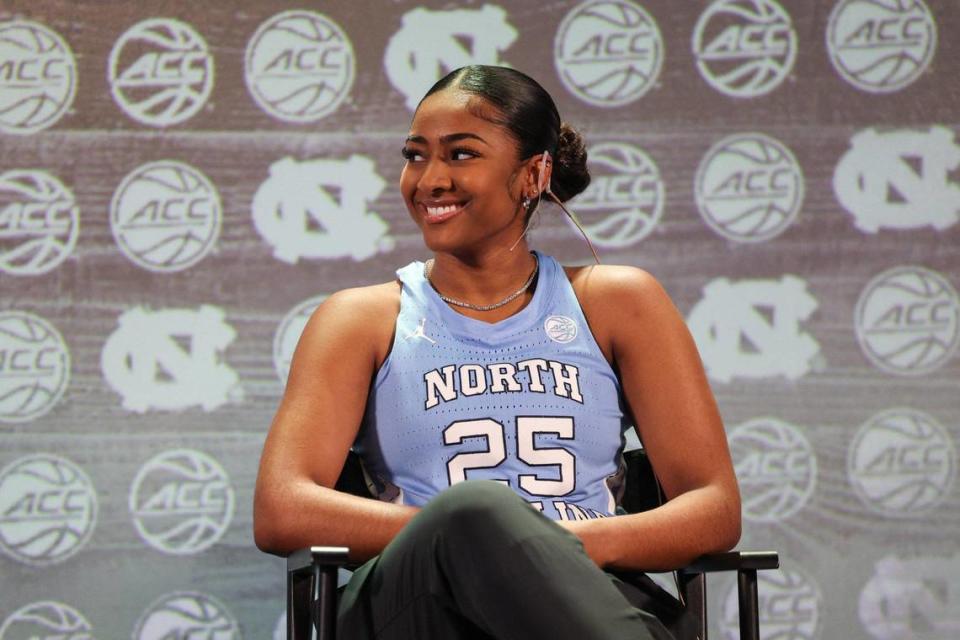UNC women’s basketball falls to Virginia Tech. 3 takeaways from the Tar Heels’ OT loss
North Carolina women’s basketball posted a third straight loss Sunday, dropping in the ACC standings after an overtime setback to Virginia Tech.
No. 24 UNC fell to the No. 17 Hokies, 70-61, at Carmichael Arena, unable to overcome a mediocre shooting performance and a stout Virginia Tech defense.
The Tar Heels (15-8, 7-4 ACC) started 0-for-7 from the field in the first quarter. They added 11 straight misses during a 2-for-15 stretch at the end of the first quarter and into the second, but remained in the game thanks to a solid defensive effort of their own to hold Virginia Tech (18-4, 9-2 ACC) to just 39 points through three quarters.
UNC rallied in the third and played evenly with the Hokies in the fourth to force overtime, but the Heels’ shooting woes returned in the extra period, where they went 1-for-8, while Virginia Tech went 3-for-5 on 3-pointers and 7-for-10 from the line.
The Heels finished with just eight second-chance points, and only six points on Virginia Tech’s 17 turnovers.
UNC’s Deja Kelly led all scorers with 26 points and seven rebounds, and Alyssa Ustby finished with 10 points, a season-high 16 rebounds and five assists.
For the Hokies, Elizabeth Kitley logged 15 points and 15 boards. Georgia Amoore scored 21 and dished out 11 assists.
“My team showed a whole lot of fight, as we’ve come to expect,” UNC coach Courtney Banghart said. “We didn’t have enough kids we could rely on to make plays inside their skill set, which put a lot of pressure on our defense. I think it ended up being what, 54 points in regulation against this team; really good defensive effort. Offensively just again, didn’t have enough we could rely on.”
Three takeaways from the Tar Heels’ loss.
Tar Heels defense disrupts Virginia Tech early
Virginia Tech took a quick lead, going ahead by nine through the first quarter, but that margin didn’t paint the whole picture.
The Hokies began Sunday averaging 78.1 points per game and shooting at a 46.8% clip. They’d made 36.3% of their 3-point attempts, best in the ACC.
But UNC’s defense was up to the task. Virginia Tech shot 24 of 71 (33.8%) from the field and 12 of 35 (34.3%) from 3-point range. Those numbers dipped in the second and third quarters, with the Heels holding their opponents to just 3-of-17 shooting from the perimeter.
Kitley and Amoore, who lead the team in scoring, combined for 13 points on 6-of-19 shooting in the first half.
That effort allowed UNC, which had its own shooting problems, to stay close.
Hokies coach Kevin Brooks and Banghart both attributed much of UNC’s defensive success to familiarity among the teams.
“I don’t even know if either team ran a play successfully,” Brooks said. “They’re calling out our plays and we’re calling out their plays. We’re beating people to the spot, and then it just becomes a matter of will.”
Brooks said he didn’t think the Hokies were out of an offensive rhythm. The team got most of the shots it wanted, he said, except when the Tar Heels switched to their zone defense.
“I think we had a turnover and we didn’t get the shot that we really wanted, but (Banghart’s) known for that. They’ll mix their defenses up. We were prepared for it. We just anticipated coming a little bit sooner, so it did throw us off there a little bit, they stayed with it and we regrouped.”
UNC offense struggles to keep up
North Carolina found some offensive success in the third quarter, hitting for 11 quick points and shooting 50%. It shot nearly 43% in the fourth quarter to tie the game at 54 and force overtime. The Heels’ struggles in the first half and overtime period, through, ultimately did them in.
Notably, Carolina received little production in the frontcourt.
Alexandra Zelaya led the forwards with six points, but those all came from the perimeter. She hit a 3-pointer with 36 seconds remaining in the third and gave the Tar Heels a lead. She sank another about four minutes later, tying the game at 44 and giving her a season-high six points.
“She’s able to space the floor because she’s shot willing,” Banghart said. “She’s certainly has an understanding how to create space for her teammates. One of my favorite plays she made is: Deja was coming down the floor and she kind of hesitated for a minute and set kind of a brush rub. Stuff like that; the nuance of how to create space for others.”
UNC scored only 24 points in the paint, below its average of nearly 30 in conference games.
Virginia Tech took Ustby out of the scoring equation for most of the game, holding her scoreless through the first half and to 10 points total. She and Kelly accounted for most of the inside scoring.
“We missed a lot of good shots, I thought,” Banghart said. “I think our inside game, collectively, was 1 for 10 or something, and, obviously we haven’t been lights out from three.”
Rebounding, shooting issues intertwined
Part of North Carolina’s loss comes down to its rebounding effort, but that is also tied to the shooting. It’s a circular situation, Banghart said.
Virginia Tech out-rebounded UNC, 52-40. The Hokies finished with 18 offensive rebounds and 34 defensive boards. Tech turned its 18 offensive rebounds into 20 second-chance points, and took five more shots than the Tar Heels.
UNC grabbed 30 defensive rebounds and 10 on offense. Ustby, however, accounted for more than half of those. She and Kelly combined for 23.
“Alyssa is such a pursuit rebounder,” Banghart said. “Take Alyssa and Deja out. I don’t know if we ever would have gotten a rebound. It comes down to the guys that play. Lexie, Indya, et cetera, they need to rebound better. There’s just no other way around it.”
Banghart noted the way UNC is shooting leads to too many defensive rebound chances, and shooting better would also help the team’s effort off the glass.
“Math is math. If you miss more shots, they get more defensive rebounds. We look at turnovers caused, we look at offensive rebounds, because it’s a function of if we’re taking the right shot. ... They wish they could go in a little bit more, but if they don’t, that’s a defensive rebound more often than not.”
This is the fourth straight game in which UNC had a rebounding disadvantage. It went 1-3 in that stretch.


